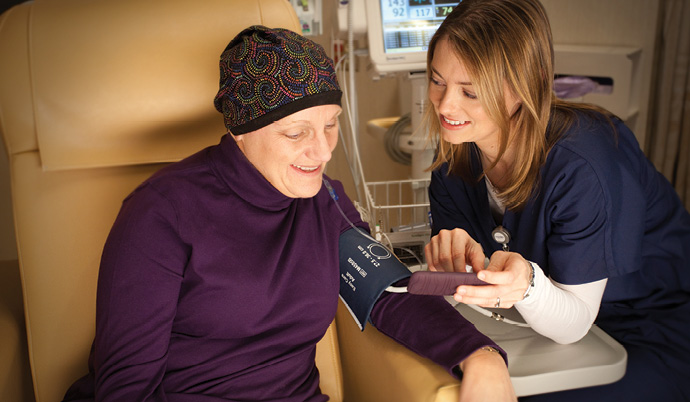Meet Your Cancer Care Team Leader
Medical oncologists use medicines, including chemotherapy, to treat cancer. These specialists can also oversee and monitor patients during and after cancer treatment.
Cancer treatment involves a team of specialists. This cancer care team could include medical oncologists, oncology surgeons, radiation oncologists nurses and other specialists. Learn more about your cancer treatment team.
Medical Oncology Treatments
You have options. Choose Sanford Cancer and partner with your medical oncologist to design a personalized treatment plan for you. Your doctor will guide you through this process, making sure you completely understand your care plan.
Your cancer treatment options include:
Chemotherapy
Chemotherapy uses drugs to kill fast-growing cancer cells. There are a variety of chemotherapy drugs created to target different cancer types. For example, some drugs work best against prostate cancer cells. Chemotherapy drugs can be injected intravenously, by shot, through a cream or using a pill.
There are side effects to chemotherapy since these drugs can’t distinguish between fast-growing bad or good cells. These drugs can affect cells in your hair, skin, nails, mouth and intestines.
Hormone Therapy
Hormone therapy is used against cancers that use hormones to grow, such as prostate and breast cancer. This technique slows or stops hormone production, which restricts cancer’s ability to grow. It is also known as endocrine therapy.
Immunotherapy
Immunotherapy uses your body’s natural defenses to fight cancer. It is usually combined with other treatments. Also called biologic therapy or biotherapy, this therapy boosts your immune system against cancer to treat early-stage cancers or to prevent the disease.
Sanford Cancer offers several immunotherapy options:
- Cancer vaccines. Vaccines designed to train the immune system to fight certain cancers. These shots are a preventive measure that work against a few specific cancers. For example, the HPV vaccine can prevent several cancers, including cervical cancer.
- Cytokines. Cytokines are a group of proteins that direct where to launch an immune response in the body. Cytokine therapy involves injecting large doses of artificial cytokines into the body. These proteins activate the immune system against cancer cells.
- Immune checkpoint inhibitors. Using drugs to teach your immune system to recognize and kill cancer cells.
- Injectable immunotherapies. Injecting proteins and compounds directly into a tumor to provoke an immune system to attack the mass.
- Monoclonal antibodies. Intravenously injecting lab-designed monoclonal antibodies. These molecules mimic or enhance the immune system’s ability to identify and fight cancer cells.
- Oncolytic viruses. Viruses engineered in a lab to destroy cancer and encourage the immune system to attack cancer cells.
- Precision immunotherapy. Using a tumor’s genetic information to identify the best immunotherapy approach to fight it.
- Specialized radiation therapy. New radiation techniques can boost a patient’s response to immunotherapy.
- Other immunotherapies. These treatments enhance a patient’s immune system to improve its ability to fight cancer.
Precision Oncology
Precision oncology refers to treatments uniquely designed to fight the patient’s specific cancer. It bases treatments on a patient’s genetic mutations, type of cancer, tumor size, location, cancer stage and more. These tailored treatments provide better results faster and with fewer side effects.
Learn more about other treatment options, including oncologic surgery and radiation oncology.
Sanford Cancer is Here for You
Here’s what you can expect from your Sanford Cancer team:
- Answers to all your questions
- Help through all the steps you need to take before, during and after treatment
- Discussion of what tests you need and the results of those tests
- Guidance in making treatment decisions to help prepare you and your loved ones for what’s ahead
- Support for coping with the stresses of cancer
-
Personalized diagnosis, treatment and care from detection to survivorship
Find an Oncologist Close to Home
Find expert, compassionate care attuned to your type of cancer and unique medical needs. You’ll get specialized treatment and emotional support from your medical oncologist.
Find a Location
Find a Doctor
Learn More

What to Expect from Infusion Treatments
Infusion treatments are cancer-fighting therapies delivered intravenously to target your specific cancer. What to expect at your infusion center:
- Private, comfortable spaces dedicated to best support your needs while you get these therapies.
- Trained oncology nurses who administer your therapies and are available throughout your stay.
- Room to bring a member of your support team with you. Feel free to bring electronics or other activities to make your stay as enjoyable as possible.
Sanford Health News
-
background-image
Colorectal cancer screening: Check out the options
With early detection, 9 out of 10 people have no evidence of their cancer 5 years later
-
background-image
Fargo cancer nurse donates bone marrow to patient in need
Bella Hukriede matched with pediatric patient just one month after joining registry
Classes & Events
-
background-image
B.E.S.T. (Basic Education for Safe Travel)
Mon 04/14/25 9:00 AM - Mon 04/14/25 10:00 AM
Sanford Children's Car Seat Safety Center -
background-image
Bismarck Stroke and Brain Injury Support Group
Mon 04/14/25 3:00 PM - Mon 04/14/25 4:00 PM
Bismarck Veterans Memorial Library
